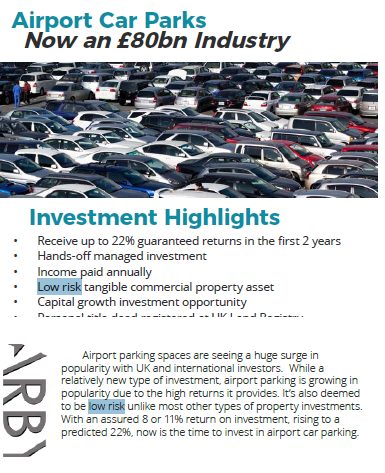Aston Darby offers unregulated investments in airport car parking spaces which promise a “guaranteed yield” of 11% in years 1 and 2, a “projected yield” of 11% in years 3 and 4 and a “projected yield” of 12% in years 5 and 6.
Status
Open to new investment.
Who are Aston Darby?

Aston Darby was incorporated on 10 March 2017. The website lists the directors as Leigh Heywood (CEO) and Rod Bailey (Director and Head of Carpark Operations). While their job titles would imply that Heywood is the head of the company, Aston Darby Group Limited is in fact 100% owned by Roderick Bailey. Due to its young age, Aston Darby Group Limited is yet to file accounts.
How secure is the investment?
These are unregulated investments and you risk losing up to 100% of your money if you cannot find a buyer when you come to sell your investment.
There is an inherent risk when an investment whose yield is variable (how much you can rent out your car parking space for, times the fraction of time the car parking space is occupied for) is attached to a “guaranteed” return.
If investors are relying on a promise by Aston Darby that they will make up any shortfall between the yield of their parking space and 11% in the first two years, they need to be confident that Aston Darby is not simply paying their own money back to them.
It is not difficult to take £25,000 from someone and pay them £2,750 a year later, and £2,750 a year after that. The question is how much they will receive when the 2-year “guaranteed yield” period is over, both in terms of continued rent (which, notwithstanding Aston Darby’s projections, is dependent on how often the space is occupied and how much people are prepared to pay for parking) and how much their investment can be sold for.
The value of your investment will depend on how much a car parking space can be sold for on the open market. Investors need to ask themselves: why would another investor buy a parking space on the secondary market, with no guaranteed yield, when they can get a parking space directly from Aston Darby offering an 11% guaranteed yield?
If car parking spaces are yielding 11% in the current economic climate, then it will not take long for competition to enter the market. What happens if the yield that can be reaped from car parking spaces drops below 11%, and what happens to the value of the car parking space in that case?
Some of Aston Darby’s car parking spaces are owned by Aston Darby itself (at minimum, those it is advertising to new investors). Investors therefore need to assure themselves that Aston Darby will not fill up its own parking spaces before it fills up those which belong to investors.
While the investment is a tangible asset, a space in the middle of a car park is only useful for parking cars in. The value of the investment is therefore inextricably linked to Aston Darby’s business and in the event of the failure of the car parking business, the value of the investment as a piece of land is likely to be near-worthless. Investors need therefore to consider the possibility of up to 100% loss.
Should I invest with Aston Darby?
As with any unregulated investment, this investment is only suitable for sophisticated and/or high net worth investors who have a substantial existing portfolio and are prepared to risk 100% loss of their money.

Any single-asset investment offering 11% per annum yields should be considered very high risk (i.e. higher risk than a diversified portfolio of stockmarket funds), contrary to Aston Darby’s literature which twice describes this investment as “low risk”.
Before investing investors should ask themselves:
- How would I feel if in year 3 the income dropped dramatically and I could not realise my investment for anything close to what I paid for it?
- How much is the investment likely to be worth once the two-year “guaranteed yield” period ends?
- Do I have a sufficiently large portfolio that the loss of most or all of my investment would not damage me financially?
If you are looking for a “guaranteed” investment, you should not invest in unregulated products with a risk of 100% capital loss.








